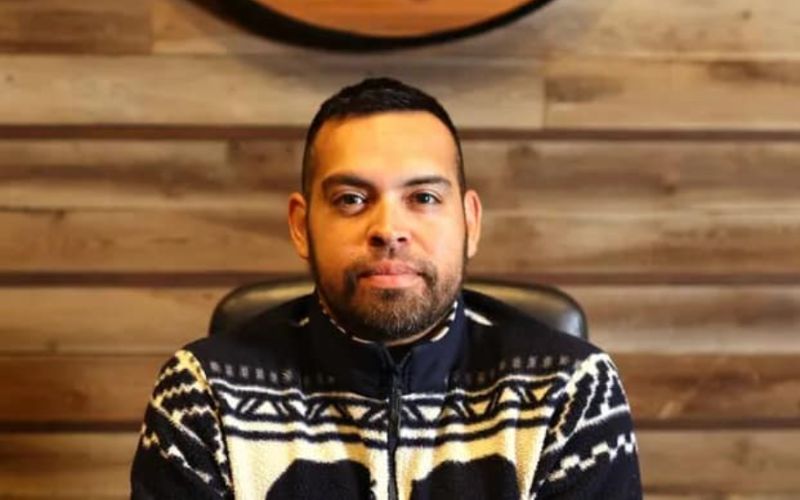
- Details
- By Elyse Wild
Two years ago, Native News Online covered a devastating week of overdoses in the Lummi Nation. Lummi Chairman Anthony Hillaire testified last week at a House subcommittee in Washington, D.C., about the reverberating effects of cartel drug trafficking in his community. As Tribal Nations continue to bear the weight of the fentanyl crisis, with high overdoses, limited resources for healthcare and the jurisdictional maze of Indian Country, Hillaire and other Tribal leaders urged lawmakers to act.
We spoke to Hillaire about the actions the Lummi Nation has taken to combat drug trafficking within its restricted jurisdiction, how they are helping relatives heal, and what gives him hope.
This interview has been edited for length and clarity.
You and I first connected in 2023 during a particularly difficult week for Lummi Nation—five overdoses back to back. How have things been since then?
It's hard to answer that question because life is so precious, and any losses to drug addiction and fatal overdoses is one too many. In comparison to back then, we haven't had that overwhelming amount of fatal overdoses in a short period of time, but we have had losses this year.
I say that with—yes, there's struggle and challenges, but it is not our identity as a people. We're strong and resilient, and we're still pushing forward on the priorities that have been set forth for generations to one day break the cycle of abuse and find healing. There's been a lot of work done in immediate response, but it's still something we're working on to address all the issues that come with the drug epidemic.
You testified last week about drug cartels operating on tribal lands. What would you like to see changed to address the jurisdictional challenges that leave Native communities vulnerable?
When we took a stance in 2023, we wanted to prioritize slowing down and stopping drugs being trafficked onto our reservation—because of fentanyl and carfentanyl, which was much stronger than regular fentanyl. With that came the uptick in need for essential healing services, which have always been underfunded.
If we could have it our way, it would be direct funding and resources and policy changes that honor treaty and trust responsibility and self-determination. We need the ability to address these issues we see on the ground without the barriers of bureaucracy and getting the funding that was promised to us in treaty.
That means self-governance expansion, pushing forward the PROTECT Act—a bipartisan bill that addresses jurisdiction concerns—and resources for healing services. If we're able to address jurisdiction and prosecute drug crimes, then we need treatment, detox services, housing, and more.
What progress has been made in the past couple years?
It starts with our community—our General Council and the people of Lummi being there for each other, finding comfort in love, prayer, and culture. That's the foundation.
At the local level, we're strengthening partnerships with cities and counties around us. At the state level, we started the State Tribal Opioid Summit, which happens annually and brings forward legislation recommendations. The state is fully funding our detox facility, which should be done by the end of this year. We're also building 40 pallet homes for low-barrier housing using opioid settlement funding.
Federally, we helped start the National Fentanyl Summit. We partnered with IHS and HHS to get funding for the detox facility. There's movement happening—we're just going to keep pushing the envelope.
From the law enforcement side, what does federal collaboration that prioritizes Native sovereignty look like?
Three things: funding, resources, and better capacity for drug interdiction. Right now we receive some BIA funding for enforcement, but it doesn't match the severity of fentanyl and drug trafficking on our reservation.
We need capacity at Lummi for our enforcement to carry out this work ourselves. When drug crimes happen on tribal land, they need to be prosecuted appropriately—not passed down to the state or lost in confusion about which judicial system handles it.
We recently had a Lummi officer shot in the line of duty—he's in stable condition now—but we can't allow that to become normal and then have it caught up in a judicial system we don't have control over.
Several lawmakers have described this as a "war against cartels in Indian Country" that's "just beginning." Do you feel like the federal government is joining Native communities in this fight?
Time will tell. I really hope so. We can say our priorities and what needs to be done, but it comes down to action. Our detox facility is one example—we heard repeatedly that it was a priority, and eventually the state and federal government did help.
But it's almost piecemeal throughout different agencies and jurisdictions—state, county, cities, federal, and tribal law. There's alignment in some areas, but it'll take time to filter through all our priorities and ensure needs are met in a timely manner, not 10 years from now.
What gives you hope?
My children—the youth. We have not forgotten who we are and where we come from. There's so much belief in our children about what it means to be Lummi and practice our way of life.
Right now we have youth at our canoe journey heading to Lower Elwha. It's beautiful to see kids put down their backpack, pick up a drum, sing the songs they were taught, and speak our language. That's our greatest hope and our future leaders.
It really lights a fire in all of us when we see our next generation coming up, especially when they're such a powerful presence. That's the foundation of everything we do.
More Stories Like This
New Mexico Will Investigate Forced Sterilization of Native American WomenUSDA Expands Aid for Lost Farming Revenue Due to 2025 Policies
Two Feathers Native American Family Services Wins 2026 Irvine Leadership Award
Bill Would Give Federal Marshals Authority to Help Tribes Find Missing Children
Indian Health Service to Phase Out Mercury-Containing Dental Amalgam by 2027

